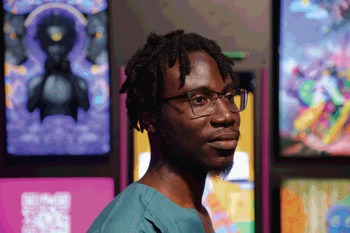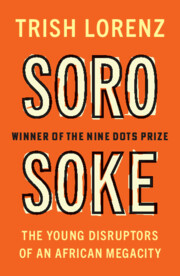‘I see contemporary art by Africans as a way of reclaiming what was lost.’
***
‘I have always believed that art should serve other purposes aside from the aesthetic purpose. I mean it’s beautiful when you hang the artwork in your space but there is the other question: What is it saying and what is it contributing to society? I started paying attention to the effects of colonialism, one of which is the looting of cultural artefacts from Africa. I see contemporary art by Africans as a way of reclaiming what was lost.

Figure 16 Osinachi, 30, is a digital visual artist based in Lagos. He has been described as ‘Africa’s foremost crypto artist’ and is currently working on the theme of the relationship between art, Africa and its cultures.
Growing up in Aba, in eastern Nigeria, I don’t think there were any galleries. Perhaps there were one or two but, growing up, I never heard about art galleries. I never heard about art shows. The only thing I was exposed to growing up were old photographs of my family. Old black and white photographs of when my dad was young, my mum was young, my grandmother. I knew through the Internet about visual art, so I just went ahead and started creating my thing. Recently, looking at a photo of my dad as a young man, I realised that I am reacting to these photos, that you can still see the influence of these photographs in my work.
I’m Nigerian before I’m African but my Igbo identity is the strongest. I call myself by my Igbo name, not my Western name, and sometimes I use Igbo words as the titles of my work. And sometimes I use the piece to interrogate my Igbo identity. If you look at a piece like In Touch, the man standing with the leopard, that is what I did there.
The Igbo people have a special relationship to the leopard, which is called agu in our language. The leopard is extinct in Igboland now but in the past people were afraid of the leopard, yet they also hunted it, especially the men. Anyone who was able to kill a leopard would be called Ogbuagu: “Killer of leopard”. It’s a very big title to have in our culture.
With colonialism, education stopped happening in the way that it should have. It is difficult for young people, even myself, to make a sentence in Igbo, without putting in an English word. Young people now use the word agu for the lion. But in this part of the world, we don’t have the lion, what we had was the leopard. It is still a conversation that young people need to have, of how we reclaim our language. There is this education that needs to happen because language is so important – one way we make sense of the world around us is through language.
Art is another way to really make sense of your world and to share that experience with people. You are transacting culturally with art. We all come from a different culture. You give me your experience, I give you my experience, visually. And we keep adding to the beauty of the world, we keep adding to conversations around diversity and culture.’

